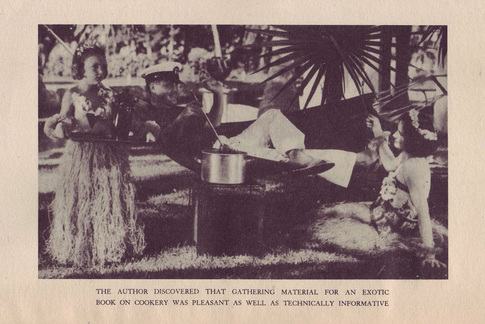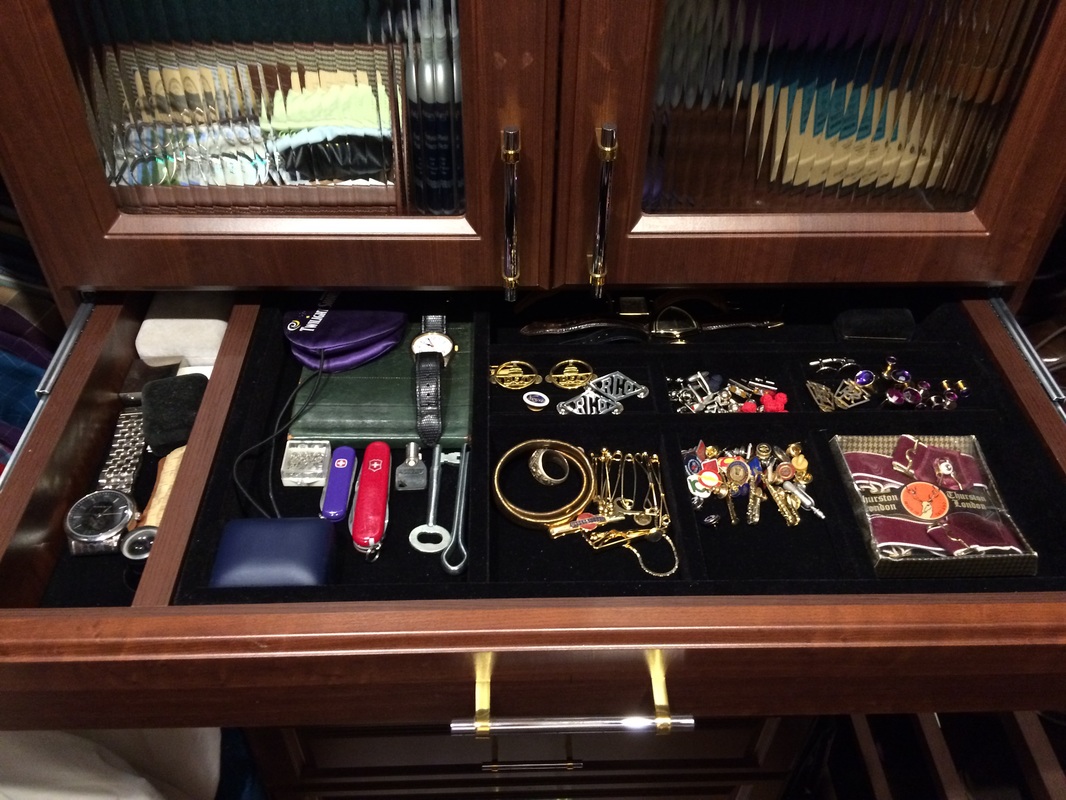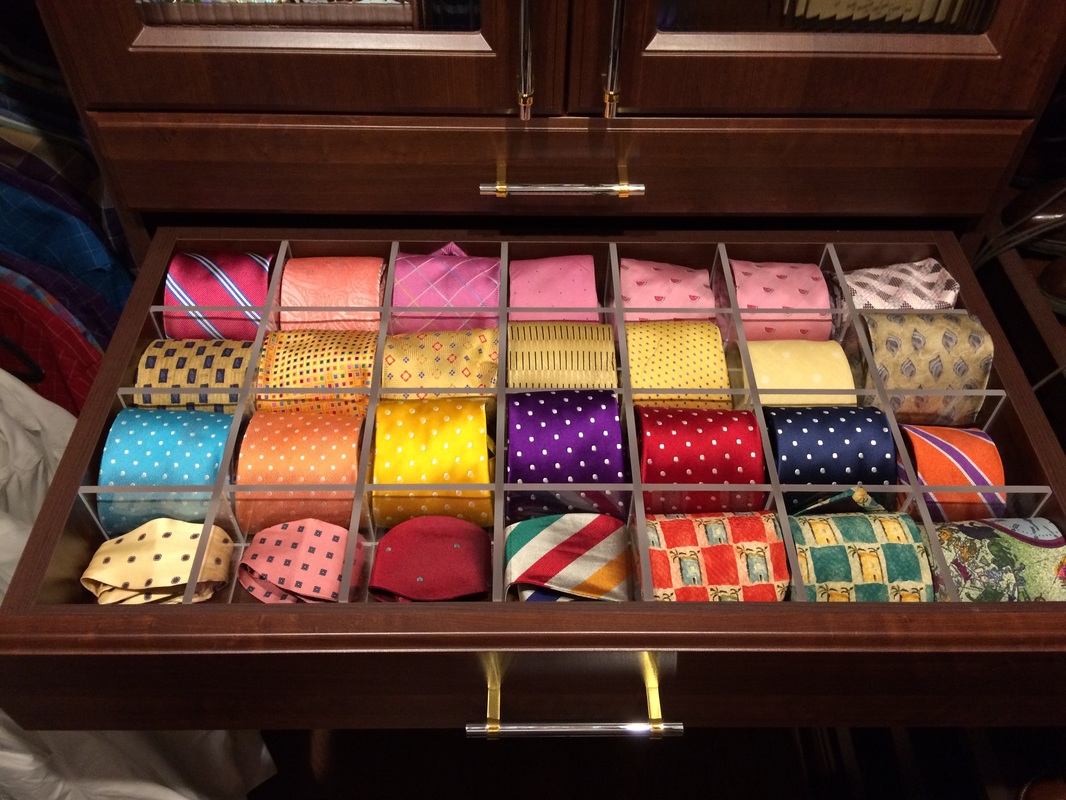|
Before you even set foot out the door to begin your journey as a flâneur, you need to make sure that your house is order, both in an allegorical and literal sense. Why is this important? Why does it even matter? Let’s talk about clutter and disorganization in the home. Both are symptoms of your state-of-mind. And if you are not clear of thought, in a methodical, organized way, you will not be able to effectively pursue flânerie as well as your capabilities would normally allow. Throughout different periods in my life, I have found myself on both sides of the coin, and in reflecting upon this, the periods of disorganization in my home always seemed to be accompanied concurrently by periods of stress in my life – virtually always work-related. It’s somewhat difficult for me still to discern the primary causal factor during those times of my disorganized home environment (e.g., did stress cause the clutter and disorganization, or did the clutter and disorganization cause the stress). I suspect that stress and disorganization feed off of each other – with one exacerbating the other. So if you can get a handle on one, you’re probably well on the way to getting control of the other. Of the two factors, I believe clutter/disorganization is the probably the easiest and quickest of which to gain effective control – but it still takes self-discipline and focus. And depending on the amount of clutter you may have accumulated in areas of your home, getting control over it may be daunting – if not downright overwhelming. There’s only one way to start: with one room and one article at a time. So if you have a bedroom, home office or basement that looks like a bomb hit it – just start picking up stuff and sort it out. I initially sort things into different piles – with each pile consisting of like-things that will ultimately be organized or stored together in a single location. You should also have a trash pile – and that perhaps should be your biggest one. With every item you pick-up or sort-out, you should be very rigorous in asking yourself whether-or-not you really, really need it. If the item is truly junk, you owe it to yourself to throw it away. If it’s still in a state-of-good-repair, but you no longer need it – make a separate pile for charitable donations (e.g., Purple Heart, Goodwill, etc.) and get the benefit of a tax deduction as well. Once everything in a particular room has been organized into piles, start work on each pile and put the stuff, neatly and well organized, in its proper place. I cannot emphasize enough how a well-organized home environment will enhance your journey as a flâneur. De-cluttering and organizing your home environment will do the same thing for your state-of-mind and put you in a position to most effectively engage in Social Interaction (not to mention the value it brings to your Image and the quality of your Lifestyle). Remember, the pursuit of flânerie is not about accumulating stuff – it’s about the quality of the social interactions you engage in with the people around you and your ability to take the time “to smell the roses” and savor life itself. This relentless pursuit of ‘stuff’ – and how most of us shortchange the quality of our very lives with what we have to do to get it – is how most of us all get caught up in “the daily grind” in the first place. When my wife and I bought our house, it came with those single, white-enameled wire shelves in all of the closets, typical in most new construction. So essentially you could hang up your clothing and store some boxes on the shelves and on the floor, but that was about it. One of the first investments we made in our house was to customize the closets in our master bedroom. I felt that it was extremely important to be able to properly organize all of my clothing and personal accouterments so that they were always visible and accessible. My bedroom closet is the first place I walk into when I start each day. To have it well organized gets each day off to a similar start. You can easily spend thousands of dollars on fully custom closets, but you can also achieve the same results by shopping around and purchasing closet components at the big box hardware stores and installing it yourself. In my opinion, based on the change it made for me in being able to find my stuff and getting my day off to a good start – I personally think it is worth the time and expense.
In the event the clutter overwhelms you in your home and you truly do not know where to begin, there are in fact personal organizing services no doubt available locally in your area. You can find one easily enough through the Internet or your local telephone book. Sometimes it can help immensely to have a professional organizer give you the needed push. Again, such a service comes at an expense. These people will work with you and assist you in determining what you need and what you don't - as well as show you how to properly store it so you know where to find it when you need it. De-cluttering and organizing your home – assuming it needs it, or course – is an important prerequisite to flânerie, in my opinion, as the resultant home environment will also help to unclutter your mind and assist you with taking a more orderly approach to your life so that you may more fully enjoy it. And that is what we want to do as flâneurs, isn't it? © 2016 David Nogar All Rights Reserved
2 Comments
 Now that the formalities of defining the philosophical framework and essentials of American flânerie have been dispensed with, there remains only one additional sine qua non before beginning the journey, namely, a brief discussion about the man who is the inspiration for this enterprise.. "If you ever wondered whose oyster the world is, meet Charles H. Baker, Jr.” Esquire Magazine, 1954 Charles Henry Baker, Jr. was born on Christmas Day in 1895 in Zellwood, Florida. His parents, Jane Paul Baker and Charles, Sr. were both apparently from the Philadelphia Main Line, though I have so far been unable to determine precisely where. Writer and restaurateur St. John Frizell has done a good job in researching the details of his early life, of which said details are rather scant. If you are interested, I would refer you to the article he wrote for the Summer 2008 issue of Oxford American, which you can navigate to from the Charles Baker link on the Resources page of this website or simply click here. Any information I would provide in this blog posting would only be duplicative of his superior efforts. In 1925 Charles Baker received an inheritance from a grandparent who was apparently successful in the Pittsburgh steel business, and this presumably gave him the resources to embark on the first of his three trips around the world, aboard the S.S. Resolute of the Hamburg-American Line. At every port-of-call, Charles Baker made it a point to seek out the most notable dining and drinking establishments, taking copious notes for the cookery and cocktail recipes he was able to obtain, as well as for the characters and other local color with which he became acquainted at each place, then filtering these notes through the perspective of his worldview into prose that ultimately became the foundation for The Gentleman’s Companion, Vols. 1 & 2, and all volumes and articles thereafter. This was a man who clearly loved fine food, drink and life, and the social interaction that went with it. And he preserved it all through his writing. It is Charles Baker’s writing style that endears him to so many, which has often been described as “baroque” in its character – indicative of an educated man-of-the-world who was keenly aware of many things, and who wove all of that awareness into a complex tapestry of imagery and obscure interconnections of knowledge, resulting in a descriptive prose that captured not only the food and drink and atmosphere of the establishments in which partook, but the previously referenced characters and local color as well, all in a dimension seldom seen. And perhaps most significantly - he captured the nature of the era itself. It is extremely important to understand the context and timeframe in which he made these journeys. The period between the World Wars, despite the economic and political hardships that were inflicted upon many, was nonetheless an exhilarating time to be alive. It was a time when communications and transportation technology had advanced to the point that almost every place in the world was accessible, but it was also still an adventure to get there. Traveling to different parts of the world at that time truly brought you into….. different worlds! Different foods; different people; different libations of every imaginable kind – not the tedious homogeneity that one fines permeating our modern globalized existence today. And it was also a very unique time when, in the words of St. John Frizell, “life [was] improbably well-lived,” regardless of where on the globe you might find yourself. And here’s an important point: it wasn’t that people had an excessive abundance of anything back then – far from it. But they seemed to make the most of what they had in the most civilized way possible. That’s the difference. Today we have abundance, but we seem to have lost either our knowledge or desire of how to use it and live graciously. So as a result, no matter where on earth Charles Baker traveled, he almost always seemed to find a place where he could quaff that distinctively American invention – the cocktail. Ingredients and presentation would always be indigenous to the locale, but nonetheless it appears to be one of those pleasurable aspects of life that a good portion of 20th century humanity had in common. And it is my observation that he embarked on his journey within a relatively narrow window of time during which the confluence of so many other cultural factors came together (e.g., technology, social conventions, style) to provide for a life experience that none of us today can ever hope to see. The world was indeed his oyster. But as we have seen, he chronicled this world for us so that we could live it through his highly unique and descriptive prose. You owe to yourself to go to the Resources page and check out at least one of his books. In 1932, Charles Baker met the woman who would become his third wife, Pauline Paulsen – daughter of August Paulsen, a Danish immigrant who came to Spokane, Washington in 1892, and who became a millionaire through his stake in the Hercules silver mine located in the Coeur d’Alenes range of the Rocky Mountains during the mid-1920’s. When August Paulsen died in 1927, much of his fortune went to his daughter, Pauline. It was a marriage made in heaven for Charles Baker. He and his wife now had millions of dollars available to them – right in the midst of the Great Depression. She shared his love of travel and drink, and so the stage was set for him to live the life of a flâneur and bon vivant until his death in 1987. They shared drinks with the likes of Ernest Hemingway, Burl Ives, Hervey Allen, Errol Flynn, William Faulkner and Robert Frost. They settled in Coconut Grove, Florida and built an estate they called Java Head, which is where Charles Baker finalized his manuscript for the Gentleman’s Companion, first published in 1939. The estate still exists by the way, and currently has a market value of about $9.3 million, with 10 bedrooms, 7.5 baths, all within almost 12,000 square feet. Just for kicks, you can see a video of the property here, if you’re so inclined. Now, I don’t have millions of dollars, nor do I live in a 12,000 square foot estate in Coconut Grove. Instead, I have a jumbo mortgage with a day job in New York City. But you know, it doesn’t matter. When I first became aware of Charles Baker, it was during a period when I was spending the better part of my own life trying to figure out what I wanted to do with the rest of it. I saw how this man lived his life through his writings. And when I saw him characterized by one critic as both, “a flâneur and bon vivant,” I knew immediately that my future aspirations and finally been defined. Charles Baker showed me how to savor the best in life, and to capture it through his wonderfully descriptive writings. So, a Charles Baker and a millionaire I am not, nor will I ever be. But I do share Mr. Baker’s passion for life, fine libations, and the ability to savor, love and share with those around me. Therefore, in thinking this through, one thing has become very clear: You don’t need great, or even modest wealth to become a flâneur - or even a bon vivant. It might be nice. But you really don’t. And in fact, I have concluded, that to be the kind of flâneur to which I aspire, in the manner that I have defined, that much money would truly be a detriment to the effort. It's really far more about one's state-of-mind than about wealth. I think I have a better way. And I’m going to lay it out here in this blog. So stay tuned. © 2016 David Nogar All Rights Reserved As noted on the introductory page to this website, the term flâneur originally connoted an idle stroller, indeed even a loafer, often seen as someone prone to wasting time, the term gradually developed a more complex and richer meaning throughout 19th century France concurrent with the accompanying industrialization of French society.
Eventually the idleness of the flâneur in the context of modern urban living was viewed in a more positive light when it became apparent that the ever-increasing pace and impersonal character of industrialized society was changing the very nature of the relationships people had with one another. In general, they had less time. They became more self-focused. They often developed a cultural cynicism, and their very notions of freedom and being were altered. Sound familiar? In the 20th century we would come to call this, "the Daily Grind," or “the Rat Race.” The flâneur is not really part of all this. Or he at least seeks to separate himself from it. He makes for himself the luxury of time – but he wastes none of it. He uses this time – to take time – to engage with those around him. Also to savor those around him, along with the best the current culture has to offer – the most eclectic food, drink, accouterments, and the most compelling intellectual concepts and thought. In short, he takes the time to savor life itself and in the process, tries to figure out what it’s all about. So what does this have to do with anything? Particularly in our present day and age? I have only recently elected to become a flâneur. As well as a bon vivant. For almost the last 50 years, I was on the ‘daily grind’ side of the American equation. Hiring on the railroad when I was 18 as a brakeman; working my way through college; slogging my way along a career path that would take me to the ranks of railroad Superintendent and General Superintendent, plus two General Manager positions, and ultimately as a rather overpaid consultant. I worked 12-14 hour days, and was on-call for the remaining time for over 40 years. Somehow in the middle of all this I managed to meet a lovely lady who became my wife over 20 years ago. Then I woke up one day and realized I was almost 60 years old. What had I done with my life that meant anything to anybody other than myself? Sure, my wife and I bought a nice house; a good number of cars; and lots of stuff. But at what price? The most precious thing we have in this life is time – and how much of that was wasted simply acquiring stuff? Upon reflection, I realized that I had treated most of the people in my life almost like two-dimensional cardboard cutouts that I just navigated around because I was singularly focused on acquiring my own life’s goals and had no time for them, or for enjoying the unique (and often free) things life had to offer through all of those years. As it turned out, I was a fool. So I got my house; I got my stuff; but I looked back on all of those decades, and realize now that there was so much more I could have savored, and fine people I could have gotten to truly know, who could have further enriched my own life, if I had only taken the time. And so, over the past couple of years, I have made it a point to transition into what I call the new American flâneur. To engage with people that I meet – even if only casually; and to savor what my surroundings have to offer based on the unique time and place in which I currently reside – recognizing that everything in our present-day lives is ever so fleeting. We consequently owe it to ourselves (and those around us) to enjoy and observe and engage what we can. But such a transition requires one to make a conscious decision that the 'daily grind’ either gets jettisoned entirely, or at the very least, remains completely subordinate to the requirements of being a practicing flâneur. That is an axiom that simply cannot be compromised in any way. On the surface, we live in a society that appears to get more crass, vulgar, corrupt and polarized by the month. But there remains much good to be found if you take on the role of a flâneur. And perhaps most important of all, you may be able to actually improve the lives of at least some of those whose lives you touch, just by taking the time to observe, learn about them, and engage. Therefore, the purpose of this blog will be to chart the course of the new American flâneur, in very specific terms. We will talk about engaging with others – both in a social context and for purposes of business networking; good food; better drink; entertainment; cool stuff; proper dress, grooming and decorum; along with some archaic civility and manners that should be restored to commonplace, contemporary American society for its betterment. And so, just to put the focus of this blog into proper perspective, if you're one of those guys who think that it's a really cool look to wear a baseball cap backwards with a hoodie, baggy shorts and flip flops walking around the mall with your wife or girlfriend - it's a safe bet that there's probably not too much here that will interest you. If on the other hand, you take pleasure is seeking the best in yourself and others, as well as the world around you, I invite you to stick around. You just might like it here. © 2016 David Nogar All Rights Reserved |
Author
David Nogar worked in railroad operations for almost 50 years until retiring from the transportation business in early 2023.
|



 RSS Feed
RSS Feed